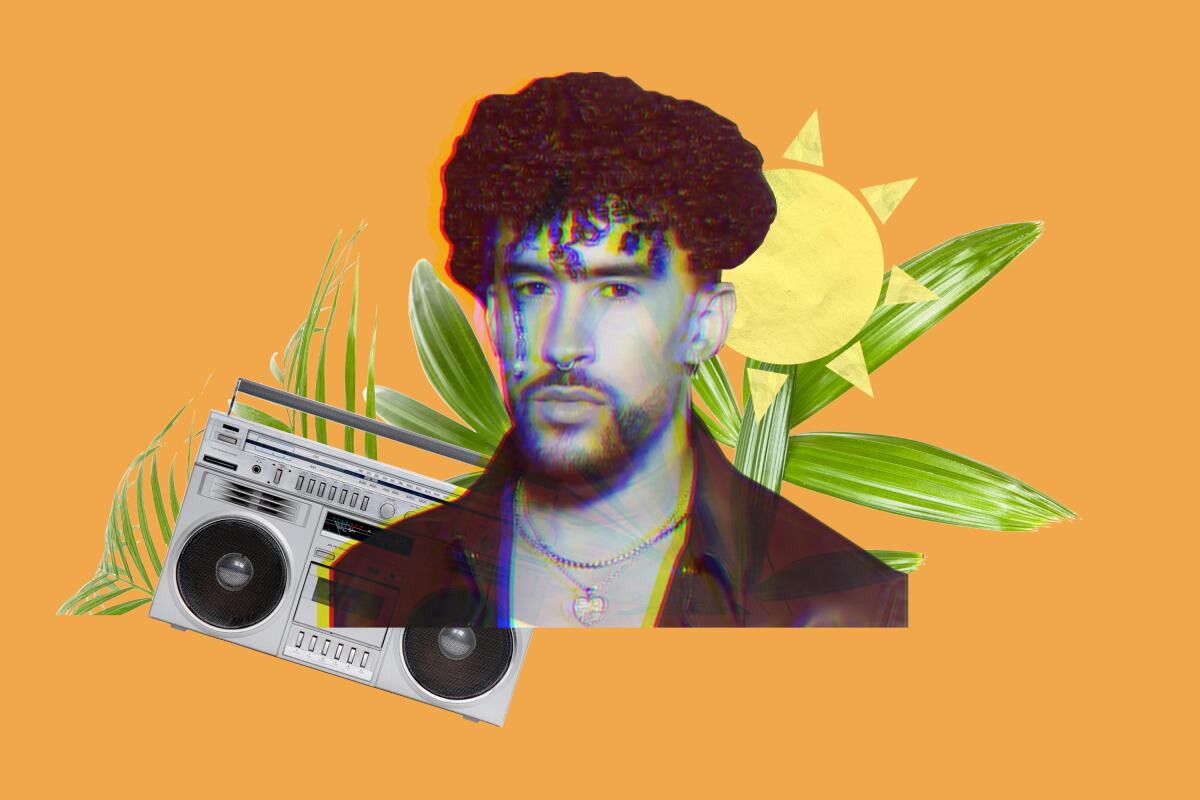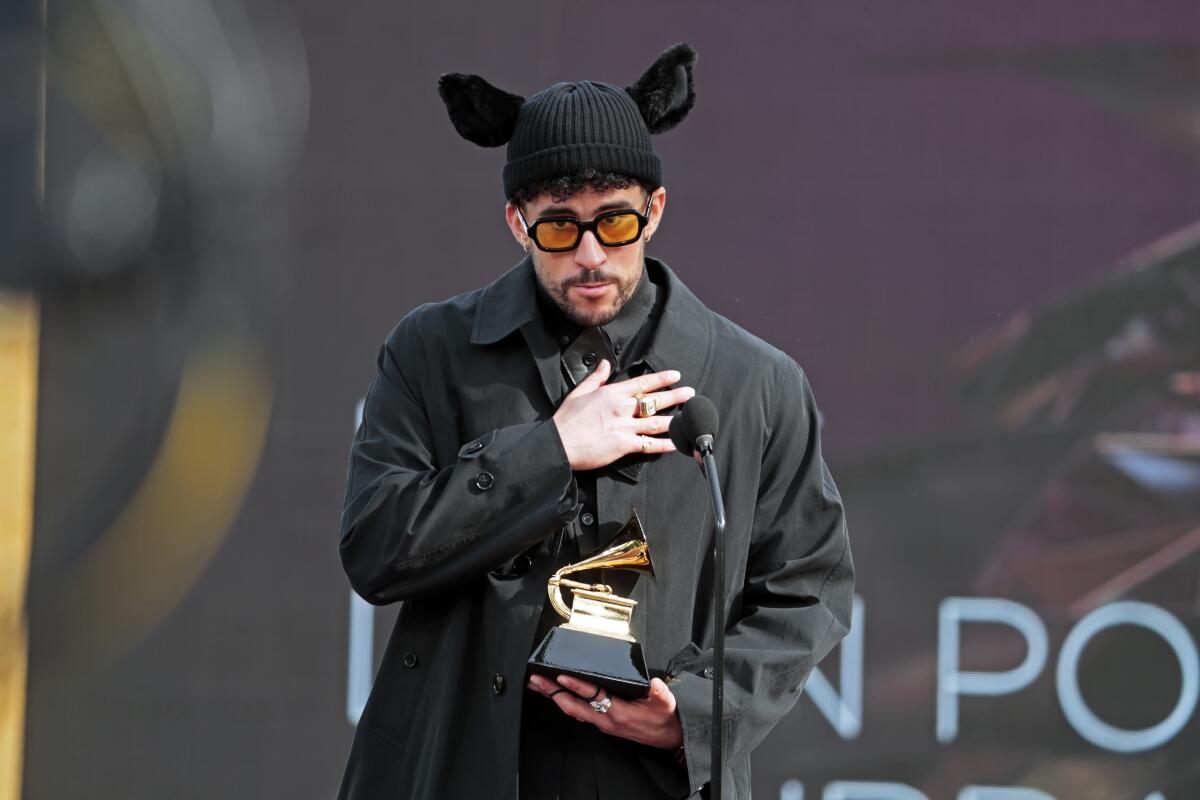For global phenomenon Bad Bunny, Puerto Rico remains his playground, battleground and muse

- Share via
If you’re young, Latino and slightly prone to melodramatics, you might be the kind of person who stays up for a midnight Bad Bunny album release.
In the streaming age, the now-familiar “surprise” Bad Bunny album drop has become an online rite of passage for his global fan base, which seems to grow exponentially with every record. Upon last Friday’s release of “Un Verano Sin Ti,” or “A Summer Without You,” fans took to their phones and computers to communally revel in its 23 songs. A procession of Puerto Rican nostalgia, each track is a time capsule stowing memories of epic seaside parties and gone-but-not-forgotten flings, touched with a residual island saudade. “Bad Bunny will have you missing somebody who never existed,” remarked fans on social media, who dressed their timelines with the most noteworthy lyrics and recorded themselves grooving along to their favorite tracks.
Even if you don’t personally fit the aforementioned character sketch of a Bad Bunny fan, it’s getting harder to circumvent the fanfare that surrounds the 27-year-old singer-MC, online and otherwise. In the days before he dropped “Un Verano,” he was modeling custom Burberry at the Met Gala, dishing with Whoopi Goldberg on “The View” and promoting his lead role in the upcoming movie “El Muerto,” in which he will play the first Latino superhero to lead a live-action Marvel film. (Come late September, he’ll make two stops at Inglewood’s SoFi Stadium, part of his 2022 stadium run.)

With every new project, Bad Bunny crashes through another industry ceiling. Released in the fall of 2020, his previous album, “El Último Tour del Mundo,” became the first No. 1 album on the Billboard 200 chart to be completely recorded in Spanish; “Un Verano” is now on track to be the second. At over 183 million plays, Bad Bunny became Spotify’s most streamed artist ever in a single day following “Un Verano’s” debut, consequently nabbing the title from his former “Mia” collaborator, rapper Drake. At this point, the only person Bad Bunny has left to compete with is himself.
Bad Bunny’s meteoric mainstream success is a feat for any Latino artist, especially a strictly-Spanish-language one, not to mention a San Juan grocery bagger turned world-famous rapper, gifted with the foresight to reject numerous major-label offers and do his own thing on his own time. (Bad Bunny releases music under the banner of independent label Rimas, now distributed by Sony Music.)

But while mile markers like “first Latino to...” are significant, what’s most impressive is that Bad Bunny remains committed to being a total oddball. Unlike his Puerto Rican predecessors Daddy Yankee or Don Omar, Bad Bunny doesn’t sing about just wooing the ladies but about empowering them. He has dressed in drag and wrestled in the WWE; in his latest music video for “Un Verano” opener “Moscow Mule,” he assumes the form of a sexless Ken doll, leaping across the sea like a dolphin.
With “Un Verano,” Bad Bunny earns these zany artistic indulgences. He’s worked hard for his place at the top, not just as a trap or reggaeton star, or even a Latino star, but as an auteur in popular music.
Just as French filmmaker Jean-Luc Godard immortalized the swinging postwar zeitgeist of 1960s Paris, or Kanye West bottled the lightning of his Chicago and alchemized it into his own dark, twisted multiverse, Bad Bunny now paints from the palette of Puerto Rico in the 2020s, devising a new modern-day lore for his people — and, with help from visionary Puerto Rican producers Tainy, MAG and La Paciencia, he realizes future-forward sounds for his peers and fans to take in.
As Mexican singer-songwriter Carla Morrison releases a new album and embarks on a tour, she’s talking openly and honestly about her mental health.
On “Dos Mil 16,” a throwback to his Soundcloud days, we meet Bad Bunny in what he calls his “last summer as a normal person,” when he was performing his first live shows and studying up on Drake; we also get to know “Andrea,” a composite of strong-minded Latinas, who just want to party in La Perla until 4 a.m. without being harmed. (This haunting pop vignette spotlights the silken voice of Raquel Berrios, vocalist of Puerto Rican dance-pop act Buscabulla.)
Bad Bunny’s Puerto Rico is at once muse and political battleground. It’s largely thanks to a global commercial interest in the island’s musical output, namely reggaeton, that Bad Bunny was able to launch his career in the first place; as a result, many a mainstream pop heartthrob has been rebranded in the image of Bunny and other Caribbean artists, furthering the gentrification of their sounds. In what feels like a course correction, “Un Verano” presents reggaeton as what it is when it’s not mediated by market forces: a timeless heritage sound, in the same league as Caribbean party staples like merengue, salsa and mambo.
Such tensions also fuel “El Apagón,” or “The Blackout.” Written amid rolling blackouts across the island — a byproduct of its power grid being transferred to a private company, the latest setback to Puerto Rico’s recovery post-Hurricane María — the song is the zenith of “Un Verano Sin Ti,” a patriotic scorcher of a club track that comes as a warning shot to all those looking to cash in on a vulnerable Puerto Rico. Even as it’s become a chic music industry destination — “Capital of perreo,” spits Bunny, “everyone wants to be Latino but they lack the sazón” — the material reality of its locals grows more stark in contrast.

These are not just the artist’s rallying cries to defend his homeland or his sound; now, at a critical moment in his career, when both the American music industry and Hollywood are fighting for a piece of Bad Bunny, he has his identity to fight for too.
Still, as is usually the case in a Bad Bunny song, it does not stop anyone from dancing through the darkness.
Over a stomping Eurodance beat, Bad Bunny’s girlfriend and newfound house diva, Gabriela Berlingeri, sings: “Let them all leave.
“This is my beach, this is my sun / This is my land, this is me.”
More to Read
The biggest entertainment stories
Get our big stories about Hollywood, film, television, music, arts, culture and more right in your inbox as soon as they publish.
You may occasionally receive promotional content from the Los Angeles Times.












